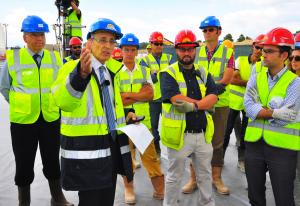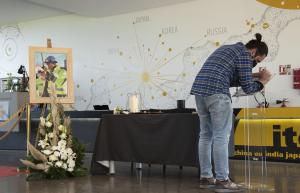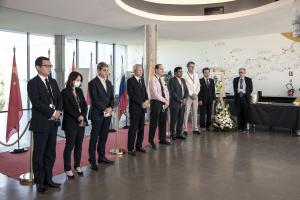Remembering Bernard Bigot, ITER Director-General 2015-2022
On the ITER site, the machinery of construction was humming just like on any weekday. Workers were concentrating on their tasks, laying rebar for new buildings or preparing for yet another assembly operation. In the offices, engineers and administrators, physicists and accountants were focused on graphs and spreadsheets, with official documents and urgent communications displayed on their computer screens. The mood, however, was one of profound sadness—ITER was experiencing its first workday without the presence, whether physical or online, of its Director-General.
Bernard Bigot passed away in the early hours of Saturday 14 May 2022. Up until his last week, as he fought the disease that was to claim him, he marshalled the strength to take the decisions that naturally fell to him as Director-General. He left this world just a few days after ITER successfully performed one of the most complex and delicate of all assembly operations: the lifting and installation of the first vacuum vessel sector module—a massive, 1,380-tonne high-tech component.
At the helm of the ITER Organization since March 2015, Bernard Bigot steered the project through particularly treacherous waters. Once appointed by the ITER Council, his first step was to implement a resolute action plan, reorganizing the project's governance, establishing a robust schedule and budget, and strengthening the cohesion between Members.
Trained as a physical chemist, Bernard Bigot had a deep understanding of the challenges that went with mastering hydrogen fusion. The experience he acquired at the highest levels of the science and research establishment—as private secretary to ministers, High Commissioner for Atomic Energy, Chairman and CEO of the French Alternative Energies and Atomic Energy Commission (CEA), and as such the principal interface between France and ITER between 2008 and 2015—had prepared him for the daunting task of leading a 35-nation, long-term endeavor, as unique in its goals as it is in its organization and governance.
However, the uniqueness of ITER required more than experience in science, the management of large institutions, and the oversight of complex construction projects. ITER—particularly at the time Bernard Bigot accepted his "mission to serve,"—demanded political finesse and diplomatic subtlety. The ITER Director-General had both in abundance and put them to the best use.
The news of his untimely passing at age 72 was felt as a blow well beyond ITER and the global science community. From academia to government spheres, from present and past partners in the nuclear world, from simple visitors to ITER who remembered how passionately he communicated his faith in the project, the outpouring of messages and testimonials has been endless. Most, if not all, include the words "thank you."
Bernard Bigot was a man of duty and service, who knew from experience that great challenges require great sacrifice. Demanding of others, he was even more demanding of himself. But beyond what could be felt as an austere demeanor, he was first and foremost a sensitive and profoundly human leader.
"For me, as for all of us," wrote Eisuke Tada, his deputy, who has been appointed by the ITER Council in the interim role of Director-General, "the greatest honour we can pay to Director-General Bernard Bigot is to continue delivering the ITER project with the same unwavering commitment and dedication that he demonstrated to all of us."
Read the official press release of the ITER Organization in English and French.
Read more about Bernard Bigot's life and career in English and French.




